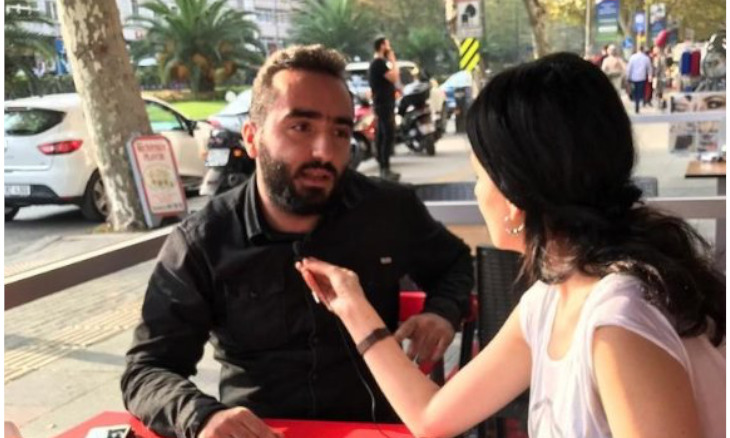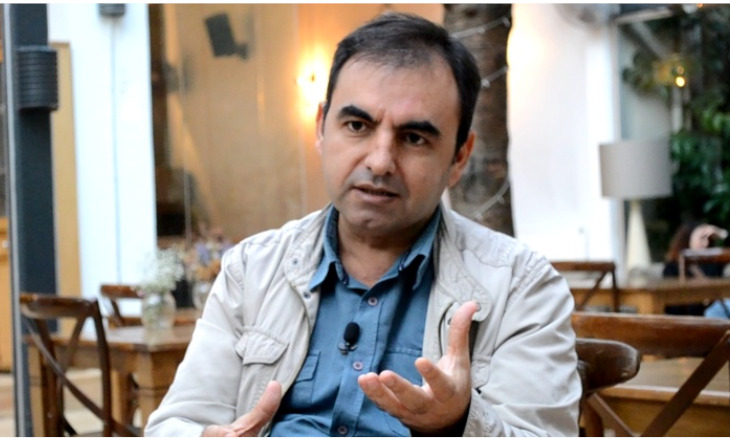Syrians in Turkey detail troubles compatriots face upon return
Many Syrians in Turkey have been living with fears of being sent back to their homeland. Yusuf Abbas came to Turkey by himself illegally in 2012. His older sister and uncles live in the Syrian city of Manbij. When asked about the possibility of being sent back to Syria to the safe zone that Turkey intends to establish, Yusuf said: “I'll go to Izmir and take the first boat across to a Greek Island."
Filiz Gazi/ DUVAR
Halit Pazaroğlu came to Turkey from the Syrian city of Homs in 2014. Two years ago, he obtained Turkish citizenship, which explains his Turkish surname. The name comes from a friend that he met after being invited on a holiday in Izmir. After he got his ID card, he showed it to his friend that inspired his last name, which made them cry. It was simple and touching.
Halit finishes every sentence by saying “ok?” because he's not sure if he's being understood. “Psychologically, it drove people mad,” he says while talking about the Syrian civil war. It is clear that Halit is a compassionate and understanding person. He even said he understands the Turkish people that are demanding that the Syrian refugees living in Turkey return to their home country.

“They are right, but at the end of the day, the things that have happened to us are not our fault. In 2003, [large numbers of] Iraqis came to Syria. We didn't realize at the time how bad their situation was. All people should understand. What has happened to us is a curse,” Halit said.
While still living in Homs, Halit said that he was thrown in prison simply because he was a student. He was imprisoned for six months, where he witnessed other inmates being tortured and said that 10-12 people were staying in cells meant for one person. He was only released after his father paid a bribe.
“In particular, they never talk about politics. Only about what to eat and drink. There are problems with electricity and the internet. It would be great even it took Syria 100 years to recover. Because there are so many that have died, every family has someone who they have lost,” Halit said about his relatives who are still in Syria.
“When I first came to Istanbul, I would walk the streets at night. I couldn't believe it. Now when I think about it I can't believe it that people [still in Syria] are living there,” Halit said.
Syrian refugees in Turkey that return to their country are either killed or imprisoned, according to Halit, who said that those who stayed behind in the first place were elderly and refused to leave their homes. Halit tried to convince his father to come to Turkey, but was unable to do so. He later was killed in a bomb attack.
Yusuf Abbas came to Turkey by himself illegally in 2012. He works as a translator. His older sister and uncles live in the Syrian city of Manbij.
“It's impossible for them to leave. It is expensive to come here and they don't have that kind of money,” adding that since Manbij is a warzone, they face problems with electricity and having enough to eat.
When asked about the possibility of being sent back to Syria to the safe zone that Turkey intends to establish alongside the border in the northeast part of the country, Yusuf said: “I'll go to Izmir and take the first boat across [to a Greek Island]. They say 'I created a safe zone for you'. Is this my safe zone? Are the houses there mine? I'll stay there as a renter. What's the rent and how will I pay it?”
“Recently they've tried to apprehend those without ID. Now take a look at Izmir, it's full. That's because it is the first place to go in order to get to Europe,” Yusuf said.
Journalist Ercüment Akdeniz said if the safe zone is established there will not be a voluntary response from refugees wanting to resettle there, and that if they are forcibly resettled there that is in violation of international law.

“In the 1990's this was tried in Bosnia and Rwanda but there were not good results. At that time, safe zones were established in warzones. People have again began fearing for their lives. Now, something even more difficult is wanting to be tried out,” Akdeniz said.
